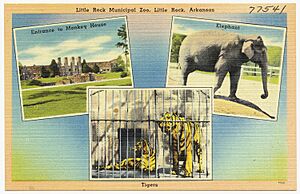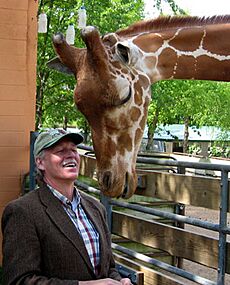Little Rock Zoo facts for kids
 |
|
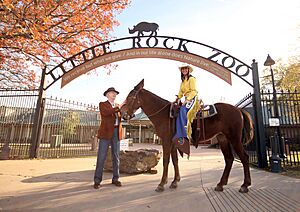
Little Rock Zoo Entrance
|
|
| Date opened | 1926 |
|---|---|
| Location | Little Rock, Arkansas, United States |
| Land area | 33 acres (13 ha) |
| Coordinates | 34°44′47″N 92°19′56″W / 34.7464°N 92.3321°W |
| No. of animals | 725 |
| No. of species | 200 |
| Annual visitors | 307,437 |
| Memberships | AZA |
| Website | http://www.littlerockzoo.com |
The Little Rock Zoo is a fun place to visit in Little Rock, Arkansas, United States. It opened in 1924 and is home to over 400 animals from more than 200 different species. The zoo covers about 33 acres, which is like 25 football fields!
The Little Rock Zoo is the biggest zoo in Arkansas. It is also the only zoo in Arkansas that is approved by the Association of Zoos and Aquariums (AZA). This means it meets high standards for animal care and education. A special group called the Arkansas Zoological Foundation helps raise money for the zoo.
Contents
- History of the Little Rock Zoo
- Exploring the Zoo's Exhibits
- Zoo Entrance Area
- Great Apes Exhibit
- Laura P. Nichols Penguin Pointe
- Primates, Reptiles, Birds, & More Building
- Asian Elephants Exhibit
- Arkansas Heritage Farm
- Small Carnivores Exhibit
- Bears Exhibit
- African Savannah Exhibit
- Africa Exhibit
- Big Cats Exhibit
- Laura P. Nichols Cheetah Outpost
- Overlook Trail
- Conservation Efforts
- Annual Events at the Zoo
- Future Plans for the Zoo
History of the Little Rock Zoo
The Little Rock Zoo began in 1924. The mayor at that time, Mayor Brickhouse, started a group to create a city zoo. Over the years, the zoo has grown a lot. It now has hundreds of animals and many different species.
Early Buildings and Growth
The first buildings at the zoo were made from local stone. They were built in the 1930s by a group called the Works Progress Administration (WPA). These buildings were made for primates, reptiles, birds, and big cats. Some of these old buildings are still used today! For example, the old cat house is now a restaurant that looks like an African lodge.
In the 1980s, new homes were built for big cats. Other new exhibits were also added for great apes, crocodiles, alligators, sloth bears, and river otters.
New Exhibits and Attractions
The 1990s brought more exciting changes. "Lemur Island" opened, and a new exhibit for African Lions was added. The zoo also got a children's farm where kids could interact with animals. A train station was built there too.
In 2007, a beautiful old carousel called "Over the Jumps" found its new home at the zoo. It was fully restored and looks amazing. Later, in 2011, the "Laura P. Nichols Penguin Pointe" opened. This exhibit is home to African penguins. The "Laura P. Nichols Cheetah Outpost" opened in 2012, giving visitors a chance to see cheetahs.
The "Arkansas Heritage Farm" opened in 2016. More recently, in 2020, the "Conservation Learning Center" was added. In 2021, new homes for Colobus monkeys and servals were built.
Exploring the Zoo's Exhibits
The Little Rock Zoo has different areas where you can see animals. These areas are often designed to look like the animals' natural homes. Some exhibits group similar animals together.
Zoo Entrance Area
When you first enter the zoo, you'll find the "Over-The-Jumps" Carousel. There's also an amphitheater for animal shows. At "Lorikeet Landing," you can see and even feed colorful rainbow lorikeets.
Great Apes Exhibit
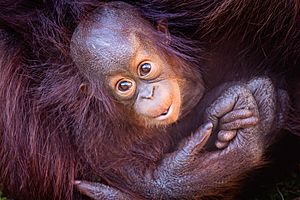
The "Great Apes" exhibit has a special walkway. This walkway lets you look down into the ape homes. On one side, you can see a family of western lowland gorillas. On the other side, you'll find chimpanzees and Bornean orangutans. They each have their own separate areas. Outside this exhibit, there are islands for other primates. These include ring-tailed lemurs, black-and-white ruffed lemurs, blue-eyed black lemurs, and black-handed spider monkeys.
Laura P. Nichols Penguin Pointe
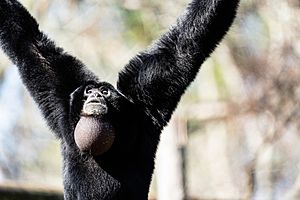
"Laura P. Nichols Penguin Pointe" is where the African penguins live. It looks like an African shoreline, similar to Boulders Beach. You can watch the penguins both above and below the water.
Primates, Reptiles, Birds, & More Building
This building was built in 1936. It features many interesting animals from all over the world. You can find primates, reptiles, and birds here.
Reptile House
In the Reptile House, you can see many types of snakes. These include the red spitting cobra, puff adder, and different kinds of pythons. Other reptiles like the American alligator, blue-tongued skink, and frilled-neck lizard are also here. You can also spot various turtles and tortoises.
Amphibians and Invertebrates
The building also has amphibians like the African bullfrog and colorful dyeing poison dart frogs. For invertebrates, you might see an Asian forest scorpion or a Chilean rose tarantula.
Primate House
The Primate House is home to smaller primates. These include the Geoffrey's marmoset, Goeldi's monkey, and Mohol bushbaby.
Tropical Bird House
In the Tropical Bird House, you can see beautiful birds. Some examples are the Roseate spoonbill, scarlet ibis, and grey peacock-pheasant. You might also spot different types of ducks and pigeons.
Asian Elephants Exhibit
The elephant exhibit is very large. It provides plenty of space for the zoo's Asian elephants to walk around outside. Visitors can watch the elephants through a big viewing window. There are also banners with famous quotes about how amazing elephants are.
Arkansas Heritage Farm
The "Arkansas Heritage Farm" exhibit is a fun place. It has the Arkansas' Diamond Express train. You can see different kinds of chickens like the araucana and silkie. There are also wild turkeys and geese. Inside the barn, you'll find mammals like donkeys, miniature horses, pygmy goats, and baby doll sheep. This area also has a butterfly garden. You can see Aldabra giant tortoises and spur-thighed tortoises here too. Next to the farm is a pond with bar-headed gooses and Chilean flamingos.
Small Carnivores Exhibit
The "Small Carnivores" exhibit features meat-eating animals from different parts of the world. You can see the red fox from North America, the caracal from Africa, and the fossa from Madagascar. From South America, there's the ocelot, and from Asia, the clouded leopard.
Bears Exhibit
At the entrance to the bear exhibit, you can see North American river otters and spotted-necked otters. One area houses a sloth bear, separated by a moat. The main attraction is the grizzly bear enclosure. It has a large glass window so you can see the grizzlies up close. At the end of the exhibit, you might spot a bush dog or a Woodchuck.
African Savannah Exhibit
The "African Savannah" is a special exhibit where different animal species live together. You can see grey crowned cranes, ostriches, blue wildebeests, and Grant's zebras all sharing the same space.
Africa Exhibit
The "Africa" exhibit features the large eastern black rhinoceros. There are also smaller homes for Angola colobus monkeys and servals.
Big Cats Exhibit
The "Big Cats" exhibit is home to powerful predators. Here you can see lions, tigers, and jaguars.
Laura P. Nichols Cheetah Outpost
The "Laura P. Nichols Cheetah Outpost" teaches visitors about efforts to protect cheetahs and other African wildlife. Along with the cheetahs, you can see Kirk's dik-diks and blue cranes outside. Inside the outpost, there are interesting animals like naked mole-rats and Madagascar hissing cockroaches.
Overlook Trail
On the "Overlook Trail," you can see many different animals. These include maned wolves, Chacoan peccaries, red river hogs, and Indian peafowl. You might also spot giant anteaters, white-handed gibbons, and siamangs. Other animals like the Greater Kudu and secretarybird are also on this trail.
Conservation Efforts
The Little Rock Zoo is part of the AZA Species Survival Plan (SSP). This means the zoo works to help save animals that are threatened or endangered. They help these species survive and grow their populations.
Annual Events at the Zoo
The zoo hosts several fun events each year. These include "Wild Wines," "Zoo Brew," and "GloWILD." These events offer special ways to experience the zoo.
Future Plans for the Zoo
The Little Rock Zoo has exciting plans for the future. They are working to create a "zoogeographic" zoo. This means they want to group animals by the continents they come from. This will help visitors learn more about different habitats. It will also create more natural environments for the animals.
Some of the planned changes include:
- An "Arkansas Farmstead" exhibit with local species. This will teach about the importance of farming in Arkansas.
- A new "Asia" area where the Great Apes exhibit is now. This will have a bigger home for elephants, orangutans, and other Asian animals.
- An "Africa" area with a new giraffe barn, a mixed-species African Veldt exhibit, and a new cheetah habitat.
- A new entrance area with a restaurant, carnival-style rides, and an ice cream parlor.
- A "New Discovery Center" for education, with new rooms, exhibits, and animals used for teaching.
 | Janet Taylor Pickett |
 | Synthia Saint James |
 | Howardena Pindell |
 | Faith Ringgold |


